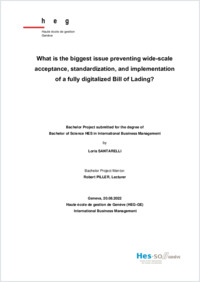What is the biggest issue preventing wide-scale acceptance, standardization, and implementation of a fully digitalized Bill of Lading?
SONAR|HES-SO
- Santarelli, Loris
- Piller, Robert (Degree supervisor)
- Genève : Haute école de gestion de Genève
65 p.
Bachelor of Science HES in International Business Management: Haute école de gestion de Genève, 2022
English
In the last decade, blockchain has experienced an international boom that has led many investors and companies to take an interest in it. Its qualities of security and transparency offer businesses an opportunity to automate and digitize some of their processes, gaining in time, efficiency, security, and cost.
While blockchain and the world of technology is constantly moving forward, commodity trading does not necessarily follow that trend. As a matter of fact, the use of paper is an integral part of the business and has been anchored for centuries in the habits. This archaic process, although accepted and used, has many problems of efficiency and fraud in international processes.
The issuance of a Letter of Indemnity has become a common practice among operations in the field. Unfortunately, document fraud is still far too frequent, causing companies and banks to lose millions of dollars. These numerous problems have pushed large companies in the field to consider modernizing their processes, particularly regarding the bill of lading.
Unfortunately, the current legal provisions are a hindrance to the legal acceptance of the use of e-cash and other electronic documents.
The transfer of possession and the exact replication of the legal functions of the bill of lading are the subject of discussion in the English court.
On the other hand, blockchain is facing some technical problems regarding its interoperability, standardization, and acceptance among all actors of the commodity trading chain. The habits anchored in the business are difficult to change and modernization is not welcomed and is seen as a risk by some participants.
This study has demonstrated the obstacles preventing the total digitization of the bill of lading and has proposed an alternative solution which is the use of a hybrid system. It seems that this is the best compromise to overcome the various obstacles such as laws, anti-discrimination, and flexibility.
While blockchain and the world of technology is constantly moving forward, commodity trading does not necessarily follow that trend. As a matter of fact, the use of paper is an integral part of the business and has been anchored for centuries in the habits. This archaic process, although accepted and used, has many problems of efficiency and fraud in international processes.
The issuance of a Letter of Indemnity has become a common practice among operations in the field. Unfortunately, document fraud is still far too frequent, causing companies and banks to lose millions of dollars. These numerous problems have pushed large companies in the field to consider modernizing their processes, particularly regarding the bill of lading.
Unfortunately, the current legal provisions are a hindrance to the legal acceptance of the use of e-cash and other electronic documents.
The transfer of possession and the exact replication of the legal functions of the bill of lading are the subject of discussion in the English court.
On the other hand, blockchain is facing some technical problems regarding its interoperability, standardization, and acceptance among all actors of the commodity trading chain. The habits anchored in the business are difficult to change and modernization is not welcomed and is seen as a risk by some participants.
This study has demonstrated the obstacles preventing the total digitization of the bill of lading and has proposed an alternative solution which is the use of a hybrid system. It seems that this is the best compromise to overcome the various obstacles such as laws, anti-discrimination, and flexibility.
- Language
-
- English
- Classification
- Economics
- Notes
-
- Haute école de gestion de Genève
- International Business Management
- hesso:hegge
- Persistent URL
- https://sonar.ch/global/documents/321852
Statistics
Document views: 57
File downloads:
- Loris SANTARELLI - IBM Commodity Trading Bachelor Thesis .pdf: 195
